#call of duty gladney
Explore tagged Tumblr posts
Text
1 month since BLOPS 6 dropped and still no Gladney post on Tumblr dot com
fine I'll do it myself
It's honestly criminal how there isn't a single post of Captain Gladney on tumblr dot com
#captain gladney#gladney#gladney call of duty#call of duty gladney#call of duty#call of duty black ops#call of duty black ops 6
40 notes
·
View notes
Link
Clint Lorance had been in charge of his platoon for only three days when he ordered his men to kill three Afghans stopped on a dirt road.
A second-degree murder conviction and pardon followed.
Today, Lorance is hailed as a hero by President Trump.
His troops have suffered a very different fate.
Depression
Fatal car crash
Shooting death
Cancer
Hospitalizations
Drug abuse
PTSD
Arrests
Alcoholism
Suicide
‘The Cursed Platoon’

By Greg Jaffe
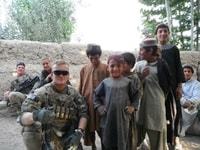
James O. Twist poses with local children during his deployment in Afghanistan in 2012. (Courtesy of the Twist family)
They thought of the calls and texts from him that they didn’t answer because they were too busy with their own lives — and Twist, who had a caring wife, a good job and a nice house — seemed like he was doing far better than most. They didn’t know that behind closed doors he was at times verbally abusive, ashamed of his inner torment and, like so many of them, unable to articulate his pain.By November 2019, Twist, a man the soldiers of 1st Platoon loved, was gone and Lorance was free from prison and headed for New York City, a new life and a star turn on Fox News.This story is based on a transcript of Lorance’s 2013 court-martial at Fort Bragg, N.C., and on-the-record interviews with 15 members of 1st Platoon, as well as family members of the soldiers, including Twist’s father and wife. The soldiers also shared texts and emails they exchanged over the past several years. Twist’s family provided his journal entries from his time in the Army. Lorance declined to be interviewed.In New York, Sean Hannity, Lorance’s biggest champion and the man most responsible for persuading Trump to pardon him, asked Lorance about the shooting and soldiers under his command.Lorance had traded in his Army uniform for a blazer and red tie. He leaned in to the microphone. “I don’t know any of these guys. None of them know me,” Lorance said of his former troops. “To be honest with you, I can’t even remember most of their names.”
The soldiers of 1st Platoon tell their story
An ‘entire month of despair’
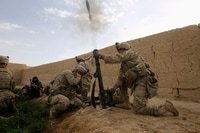
Soldiers from the 1st Platoon fire a mortar during a firefight with Taliban in April 2012 in Kandahar province, southern Afghanistan. (Baz Ratner/Reuters)
The 1st Platoon soldiers came to the Army and the war from all over the country: Maryland, California, Pennsylvania, Oregon, Indiana and Texas to name just a few. They joined for all the usual reasons: “To keep my parents off my a–,” said one soldier.
“I just needed a change,” said another.
A few had tried college but quit because they were bored or failing their classes. “I didn’t know how to handle it,” Gray said of college. “I was really immature.”
Others joined right out of high school propelled by romantic notions, inherited from veteran fathers, grandfathers and great-grandfathers, of service and duty. Twist’s father served in Vietnam as a clerk in an air-conditioned office before coming back to Michigan and opening a garage. In his spare time Twist Sr. was a military history buff, a passion that rubbed off on his son, who visited World War II battle sites in Europe with his dad. Twist was just 16 when he started badgering his parents to sign his enlistment papers and barely 18 when he left for basic training. His mother had died of cancer only a few months earlier.
“I got pictures of him the day we dropped him off, and he didn’t even wave goodbye,” his father recalled. “He was in pig heaven.”

Members of the 1st Platoon James O. Twist, Reyler Leon, Joe Morrissey, Andy Lehrer, Mike McGuinness, Dallas Haggard (kneeling) and Brandon Krebs pose with a flag in Afghanistan in 2012. (Courtesy of the Twist family)
Several of the 1st Platoon soldiers enlisted in search of a steady paycheck and the promise of health insurance and a middle-class life. “I needed to get out of northeast Ohio,” McGuinness said. “There wasn’t anything there.”
In 1999, he was set to pay his first union dues and go to work alongside his steelworker grandfather when the plant closed. So he became a paratrooper instead, eventually deploying three times to Afghanistan.
McGuinness didn’t look much like a paratrooper with his thick, squat body. But he liked being a soldier, jumping out of planes, firing weapons and drinking with his Army buddies. After a while the war didn’t make much sense, but he took pride in knowing that his soldiers trusted him and that he was good at his job.
Nine months before 1st Platoon landed in rural southern Afghanistan, a team of Navy SEALs killed Osama bin Laden.

Jarred Ruhl, Dallas Haggard and Mike McGuinness in Afghanistan in June 2012. (Courtesy of the Carson family)
Samuel Walley, the badly wounded soldier Twist pulled from the blast crater, wondered if they might be spared combat. “Wasn’t that the goal to kill bin Laden?” he recalled thinking. “Isn’t that checkmate?”
Around the same time, Twist was trying to make sense of what was to come. “I feel like the Army was a good decision, but also in my mind is a lot of dark thoughts,” he wrote in a spiral notebook. “I could die. I could come back with PTSD. I could be massively injured.”
“Maybe,” he hoped, “it will start winding down soon.”
But the decade-long war continued, driven by new, largely unattainable goals. When McGuinness saw where the platoon was headed — just 15 or so miles from the spot in southern Afghanistan where he had spent his second tour — he warned the new soldiers they were going to be “fighting against dudes who just really f—ing hate you.”
[ Are you a veteran? We want to hear your response to this story.4 ]
They were told by commanders they were waging a counterinsurgency war in which their top priority was winning the support of the people and protecting them from the Taliban. But no one seemed entirely sure how to accomplish that goal. They helped build a school that never opened because of a lack of teachers and willing students. They met with village elders who insisted they knew nothing about the Taliban’s operations or plans.
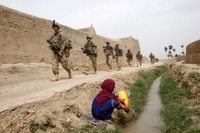
An Afghan girl watches as soldiers from the 1st Platoon walk by during a mission in April 2012, in the Zhary district of Kandahar province, southern Afghanistan. (Baz Ratner/Reuters)
In May 2012, they moved to a new compound near Payenzai, a remote Afghan village west of Kandahar, which consisted of little more than mud-walled houses, hardscrabble farmers and the Taliban.
So began what Twist described, in a blog post written years later, as an “entire month of despair.”
Four soldiers were severely wounded in quick succession. On June 6, Walley lost his leg and arm to a Taliban bomb. Eight days later, yet another enemy mine wounded Mark Kerner and 1st Lt. Dominic Latino, the platoon leader. Then, on June 23, a sniper’s bullet tore through Matthew Hanes’s neck, leaving him paralyzed.
The platoon was briefly sent back to a larger base a few miles away to shower, meet with mental-health counselors and pick up their new platoon leader. Lorance had served a tour as an enlisted prison guard in Iraq before attending college and becoming an infantry officer. He had spent the first five months of his Afghanistan tour as a staff officer on a fortified base.
This was his first time in combat.

1st Lt. Clint Lorance during training at Fort Bragg before the deployment to Afghanistan in 2012. (Photo by Alan Gladney)
“We’re not going to lose any more men to injuries in this platoon,” he told then-Sgt. 1st Class Keith Ayres, his platoon sergeant, shortly after taking over on June 29, according to Ayres’s testimony.
His strategy, he said, was a “shock and awe” campaign designed to cow the enemy and intimidate villagers into coughing up valuable intelligence. When an Afghan farmer and his young son approached the outpost’s front gate and asked permission to move a section of razor wire a few feet so that the farmer could get into his field, Lorance threatened to have Twist and the other soldiers on guard duty kill him and his boy.
“He pointed at the child . . . at the little, tiny kid,” Twist testified. He estimated the child was 3 or 4 years old.
On Lorance’s second day, he ordered two of his sharpshooters to fire within 10 to 12 inches of unarmed villagers. His goal was to make the Afghans wonder why the Americans were shooting at them and motivate them to attend a village meeting that Lorance had scheduled for later in the week, his soldiers testified.
His real motive, though, seems to have been cruelty. “It’s funny watching those f—ers dance,” Lorance said, according to the testimony of one of his soldiers. Lorance didn’t pull the trigger. Instead, he stood by his men in the guard towers, picked the targets and issued orders. His troops finally balked when he told them to shoot near children. They refused again a few hours later when he ordered them to file a false report saying that they had taken fire from the village.
“If I don’t have the support of my NCOs then I’ll f—ing do it myself,” Lorance exclaimed, according to testimony, referring to noncommissioned officers.
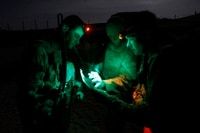
Sgt. 1st Class Keith Ayres looks over maps with other soldiers from the 82nd Airborne Division in April 2012, before a joint mission with the Afghan army in Kandahar province. (Baz Ratner/Reuters)
On the day of the killings for which he would be convicted, Lorance posted a sign in the platoon headquarters stating that no motorcycles would be permitted in his unit’s sector. The platoon’s soldiers were falsely told before the day’s patrol that motorcycles should be considered “hostile and engaged on sight.” Several soldiers testified that Lorance told them that senior U.S. officials had ordered the change. At least two sergeants recalled the guidance had come from the Afghans and did not apply to U.S. forces. Due to the conflicting testimony, the jury of Army officers acquitted Lorance of changing the rules of engagement. Still, Lorance’s actions left soldiers confused on the critical, life-or-death question of when they were authorized to open fire.
The mission that day was a foot patrol into a nearby village to meet the elders.
Less than 30 minutes after they rolled out of the gate, three men on a motorcycle approached a cluster of Afghan National Army troops at the front of their formation. Lorance and his troops were standing about 150 to 200 yards away in an orchard, tucked behind a series of five-foot-high mud walls on which the Afghans grew grapes.
At the trial, Lorance’s soldiers recalled how he had ordered them to fire.
“Why aren’t you shooting?” he demanded.
A U.S. soldier fired and missed. The motorcycle carrying the three men, none of whom appeared to be armed, came to a stop. Upon hearing the shots, McGuinness began running toward Lorance, who was closer to the front of the U.S. patrol, to see why they were shooting.
The puzzled Afghans were now standing next to the stopped motorcycle, “trying to figure out what had happened,” according to one soldier’s testimony. Gray, who was watching from a nearby armored vehicle, recognized the eldest of the three men as someone the Americans regularly met with in the village. He recalled the Afghans waving at them.

Todd Fitzgerald testifies during Clint Lorance’s 2013 court-martial at Fort Bragg, N.C.
“Smoke ’em,” Lorance ordered over the radio.
At first Gray and the other soldiers in the armored vehicle weren’t sure whom Lorance wanted them to shoot. “There was a back and forth with the three of us in the vehicle,” Gray recalled in an interview.
Then Pvt. David Shilo, who was in the turret of the armored vehicle just inches from Gray, fired, striking one of the men, who fell into a drainage ditch. Because the platoon had been told that morning that motorcycles weren’t allowed in their sector, Shilo testified that he thought he was acting on a lawful order. Shilo declined to be interviewed.
The two surviving Afghan men bent to retrieve their dead colleague when Shilo cleared his weapon and shot again, killing a second Afghan. The third man ran away. Two U.S. soldiers testified that it was possible that an Afghan soldier also fired.
A few minutes later, a boy approached the dead men and the motorcycle, which was standing on the side of the road with its kickstand still down. Lorance ordered Shilo to fire a third time and disable the bike. This time he refused.
“I wasn’t going to shoot a 12-year-old boy,” Shilo testified.

David Shilo testifies during Clint Lorance’s 2013 trial at Fort Bragg, N.C.
Relatives of the dead were now on the scene screaming and crying. Lorance’s immediate superior officer, Capt. Patrick Swanson, who was two miles away and couldn’t see what was happening, ordered him over the radio to search the bodies.
Lorance was convicted of lying to Swanson, telling him that villagers had carried off the corpses before his men could examine them. In fact, Lorance’s troops searched the bodies of the dead Afghans and found ID cards, scissors, some pens and three cucumbers, but no weapons, according to testimony.
The troops continued their patrol into the village while McGuinness and a small team of soldiers provided cover from a nearby roof. About 30 minutes after the first shooting, McGuinness spotted two Afghan men talking on radios.
“We have to do something to the Americans,” one of the men was saying, according to U.S. intercepts. McGuinness and his troops received permission from the company headquarters to fire and killed the two men. The platoon cut short the patrol and returned to the base.
At the outpost the soldiers were shaken. “This doesn’t feel right,” Gray said.
“It’s not f—ing right at all,” McGuinness replied.

Lucas Gray, Joe Fjeldheim and Mike McGuinness in Afghanistan 2012. (Courtesy of the Carson family)
A few minutes later Lorance burst into the platoon’s headquarters ebullient. “That was f—ing awesome,” he exclaimed, according to court testimony.
“Ayres looked sick,” one of the platoon’s soldiers testified. McGuinness was furious.
The lieutenant tried to reassure his sergeants. “I know how to report it up [so] nobody gets in trouble,” he said, according to testimony.
Lorance’s soldiers turned him in that evening, and at the July 2013 trial, 14 of his men testified under oath against him. Four of those soldiers received immunity in exchange for their testimony. Lorance did not appear on the stand, and not one of his former 1st Platoon soldiers spoke in his defense. The trial lasted three days. It took the jury of Army officers three hours to find him guilty of second-degree murder, making false statements and ordering his men to fire at Afghan civilians. The jury handed down a 20-year sentence.
In response to a Lorance clemency request, an Army general reviewed the conviction and reduced the sentence by one year.
‘Why do you care so much?’
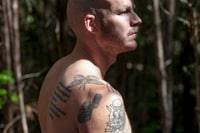
Dave Zettel reveals a tattoo of a lighter to represent the 82nd deployment outside his home in Blythewood, S.C. (Bonnie Jo Mount/The Washington Post)
The war crimes and their aftermath followed Lorance’s soldiers home to Fort Bragg and, in some cases, into their nightmares. On many nights Gray woke up to the image of a group of Afghan soldiers surrounding his cot and emptying their rifles into his sleeping body in retaliation for the murders.
“I dreamed it,” he said, “because I thought that’s what would happen.”
Dave Zettel wasn’t on the patrol when the killings were committed but was in the guard tower when Lorance ordered him and another soldier to fire harassing shots into the neighboring village. On his first full day back in the States, Zettel went out to a dinner with a large group from the platoon and their families.
By the end of the night, the soldiers, rattled from the tour, the stress of Lorance’s upcoming trial and the return home, were intoxicated and emotionally falling apart. Zettel held it together until he was alone in a taxi with his wife and brother. In the quiet of the cab, he felt a crushing guilt that he had made it home unscathed.
“I just lost my s—. I felt like a failure,” he said. “I felt abandoned and so f—ing angry.”
In Afghanistan, Army investigators, who were primarily pursuing Lorance, threatened Zettel with aggravated assault charges for the shootings in the tower. And they showed McGuinness a charge sheet accusing him of murder for killing the Afghans who were talking on the radios about targeting Americans.
The threats of prosecution hung over them for months. Eventually, the Army concluded that McGuinness’s actions were justified. Prosecutors never pursued charges against Zettel.
Instead the Army issued administrative letters of reprimand to Zettel and Matthew Rush, the soldier who fired the rounds at the civilians from the tower. Zettel had watched from the tower but did not shoot.
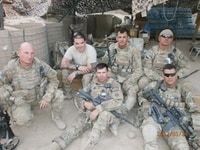
The 1st Platoon leadership team in Afghanistan in May 2012. From left: Dan Williams, Mike McGuinness, Chris Murray (sitting), Keith Ayres, Dominic Latino and Jace Myers (sitting, right). (Courtesy of the Carson family)
Ayres and McGuinness — the senior sergeants in the platoon — received disciplinary letters, which can hinder or delay promotions, for their failure to turn Lorance in sooner or stop the killings on the third day.
McGuinness legally changed his surname, which had been Herrmann, in an effort to shed the stigma of the crimes. “I wanted to get away from the entire situation and I thought I’ll change units and no one will know,” he said. But, because of the investigation and trial, McGuinness’s orders to report to an airborne unit in Italy were canceled. “I ended up staying. People didn’t forget,” he said. “It was awful.”
Shilo, who fired the fatal shots at the men on the motorcycle, was granted immunity and left the Army not long after the trial.
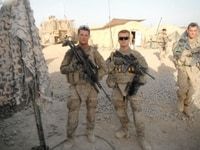
Lucas Gray and James O. Twist in Afghanistan in 2012. (Courtesy of the Twist family)
Even those who weren’t punished or even on the patrol that day felt tainted. To some of their fellow troops they were the “murder platoon,” a bunch of out-of-control soldiers who had wantonly killed Afghans. To others they were turncoats who had flipped on their commander. Gray was waiting for a parachute jump at Fort Bragg when he overheard a lieutenant colonel deride the platoon as nothing but a bunch of “traitors and cowards.” Gray was just a low-ranking specialist, so he kept his mouth shut.
The unit had seen some of the heaviest fighting of the long Afghanistan war, but received no awards for valor. There was no recognition for Twist, who had pulled Walley from a blast crater and applied a tourniquet to the remains of his arm and leg. No one acknowledged Joe Fjeldheim, the platoon medic, who had cut a hole in Hanes’s neck and inserted a breathing tube after a sniper’s bullet left him paralyzed and choking for air.
“Not a single write up. The only thing we received were Purple Hearts for the guys that got messed up,” Zettel said. “We were treated like we had an infectious disease. The Lorance issue evaporated any support from the Army when we got back, and it was absolutely crushing to those who needed help.”
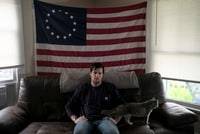
“I think when you see stuff like that sometimes it just flips a switch in some people and you’re just not the same. … I almost drank myself to death for two years,” said Lucas Gray at home in Pulaski, Va. (Bonnie Jo Mount/The Washington Post)
A group from the unit gathered regularly at Zettel’s apartment off post to drink. Some Saturdays Fjeldheim would show up at 9:30 a.m. with booze and a plan to stay numb through the weekend. When the troops were too hung over to make it to mandatory morning formation and training, he would administer intravenous drips in the barracks.
“I was working at Macy’s, and I’d dread coming home because someone was doing something stupid or crying in the bathroom,” said Zettel’s wife, Kim. Often, it fell to her to offer a bit of empathy.
The soldiers blamed the killings when they were passed over for promotions or stripped of rank for drinking too much or missing formations. In early 2014, Gray was hospitalized for alcohol withdrawal and put on suicide watch. He had been drinking a half-gallon of whiskey each night to fall asleep. “It was my off switch,” he said. A few days into his hospital stay, when he was still dosed up on Valium, an officer visited him.
“Why are you like this?” the officer pressed. “They are just dead Afghans. Why do you care so much?”
The question infuriated Gray. Before the war crimes, he had believed he was helping Afghans and defending his country. “It’s like you’re this hardcore Christian and some entity drops from the ceiling and says it’s a sham,” he said. “That’s how it was for me. I thought of the Army as this altruistic thing. I thought it was perfect and honorable. It pains me to tell you how stupid and naive I was. The Lorance stuff just broke my faith. . . . And once you lose your values and your faith, the Army is just another job you hate.”
‘You need to stop running your mouth’

Mike McGuinness at home in Raeford, N.C. McGuinness legally changed his surname, which had been Herrmann, in an effort to shed the stigma of the crimes. (Bonnie Jo Mount/The Washington Post)
McGuinness tried to intervene on behalf of his soldiers. He talked to Gray’s new commanders, who McGuinness said wanted to run him out of the Army for being drunk.
“Did you ask him why he’s drinking too much?” McGuinness pressed them.
Zettel asked McGuinness to meet with his new platoon sergeant when the Army, without explanation, blocked him from attending Ranger School.
McGuinness also spoke up for Jarred Ruhl, who had been one of his best soldiers in combat. Ruhl came home from Afghanistan with orders for Hawaii and a promotion to sergeant. But he soon began skipping morning formation, was demoted twice to private first class and forced from the Army.
“I just don’t know how to deal with everything that happened,” Ruhl told him. He had been standing next to Lorance when the lieutenant gave the orders to kill the Afghan men.

Jarred Ruhl holds an M203 grenade launcher mounted on his rifle as Dallas Haggard works the M240B machine gun while on duty in Afghanistan in June 2012. (Courtesy of the Carson family)
McGuinness, who said he felt like a failure for not stopping the killings or shielding his men from the fallout, was also self-destructing. “I was mouthy and insubordinate,” he said. He felt distant from his two young children and said he was drunk “six days a week.”
When conservatives rushed to turn Lorance into a hero, McGuinness felt as though the last shreds of his integrity were under assault. Former Lt. Col. Allen West, who had been relieved of command in 2003 for staging a mock execution of an Iraqi prisoner and was later elected to Congress in the tea party wave, blasted Lorance’s conviction in a Washington Times op-ed as a product of the Army’s “appalling” rules of engagement.
The rules were drafted by generals who worried that high civilian casualty rates were driving Afghans to support the Taliban. But West insisted that the rules put U.S. troops at undue risk and reflected President Barack Obama’s “outrageous contempt for the military.” West didn’t respond to a request for comment.
Fox News’s Sean Hannity took up Lorance’s case, calling the conviction a “national disgrace.”
In 2014, McGuinness was out drinking with an Army friend, and when the friend went home, stayed at the bar until he had downed enough booze to “sedate a rhino.” A military police officer found him later that night, sitting in his truck on All American Parkway, the main drag through Fort Bragg, with a gun in his mouth.
A nurse in the psychiatric ward at Womack Army Medical Center asked him if he really wanted help. “If you tell me that to get better, I’ve got to eat a 100-pound bag of gummy bears, then I’m going to eat 100 pounds of gummy bears,” he recalled telling her. “I just can’t do this s— any more.”
It was the end of a 16-year Army career.

Matthew Hanes during his deployment in Afghanistan in May 2012. (Photo by Dave Zettel)
Soon the platoon began to suffer losses at home. First Kerner, who was wounded in a bomb blast with the unit’s first platoon leader, died in March 2015 of cancer at age 23. Doctors discovered the malignancy when they were treating his combat wounds. Five months later Hanes, who was paralyzed by the bullet he took to his neck, died of a blood clot at age 24.
“Saying I love you doesn’t even scratch the surface of how much you truly mean to me,” he wrote in a note to the platoon three months before he fell into a coma. His closest friends from the unit — Zettel, Dallas Haggard and Fjeldheim, the medic who saved his life — were at his bedside in York, Pa., during his final unconscious hours.
At the funeral there was heavy drinking, just like at Bragg, but now that many in the platoon were out of the Army and no longer had to worry about drug tests, there was also cocaine to numb the pain.
Wives traded tips about how to persuade their husbands to go to therapy and talked about hiding their guns when they grew too depressed.
Ruhl complained to McGuinness that life at home felt empty. “Are you in therapy?” asked McGuinness, who was seeing a therapist and getting ready to start college at age 33.
“I don’t know if I can do it,” Ruhl said.
“It doesn’t f—ing matter what you think you can do,” he pressed. “It can’t make things worse.”
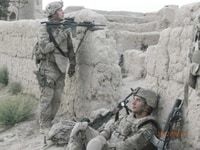
Dallas Haggard and Jarred Ruhl while on a long patrol in Afghanistan in June 2012. (Courtesy of the Carson family)
A few months later Zettel, who had finished college and was commissioned as an officer, stopped in to see Ruhl at his home in Fort Wayne, Ind. Zettel was on his way to a leadership course for new Army officers in Missouri.
Ruhl’s stepbrother told him that Ruhl had pulled a gun on a woman in a traffic dispute just days earlier. “Take his gun,” Zettel advised Ruhl’s stepbrother. “Take it apart and hide the pieces so that he can’t get it.” It was impossible, the stepbrother said. Ruhl took his gun everywhere.
Ruhl confided to Zettel that there were days when he couldn’t stop thinking about killing himself.
“How are we going to fix this?” asked Zettel, who helped Ruhl sign up for counseling at a VA hospital.
Before he could start, Ruhl pulled his gun on an acquaintance at a party. His stepbrother tried to wrestle it away and the firearm discharged, severing Ruhl’s femoral artery. He died before paramedics arrived.
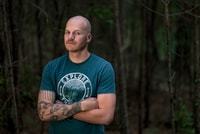
“We kind of got betrayed,” said Dave Zettel outside his home in Blythewood, S.C. “We were pegged as if we were like a rogue unit. Which we clearly weren’t. It was kind of disheartening.” (Bonnie Jo Mount/The Washington Post)
Zettel came back for the funeral, then returned to Missouri to finish his five-month leadership course. Four years had passed since the war crimes, but the murders and their aftermath still seemed inescapable. A captain teaching Zettel’s class on rules of engagement used Lorance as a case study, telling the new officers that Lorance had been trying to impose discipline on a platoon that had lost control after one of its soldiers was shot in the neck. The captain was referring to Hanes, who had given Zettel his first salute when he was commissioned as an officer.
Lorance’s soldiers, the captain continued, had violated the rules of engagement and now Lorance, who hadn’t fired a shot, was serving a 19-year prison sentence.
Zettel blew up. “I was there and you need to stop running your mouth,” he recalled shouting at the instructor.
The instructor suggested they step out of the classroom. Zettel grew angrier.
“If I ever see Lorance on the street,” he said. “I am going to rip his f—ing throat out.”
‘Y’all are being led the wrong way’

Sean Hannity of Fox News arrives in National Harbor, Md., on March 4, 2016. (Carolyn Kaster/AP)
Six days after Trump was inaugurated as president, Hannity asked him in a White House interview about pardoning Lorance. “He got 30 years,” Hannity said incorrectly. “He was doing his job, protecting his team in Afghanistan.”
“We’re looking at a few of them,” said Trump of the case.
In the months after his conviction, Lorance had begun to receive support from United American Patriots ( UAP ), a nonprofit group that represents soldiers accused of war crimes. UAP helped Lorance find new lawyers who claimed in an appeals court filing that they had uncovered evidence showing that the younger victim was “biometrically linked” to a roadside bomb blast that occurred before his death. The sole survivor, the lawyers said, took part in attacks on U.S. forces after the Americans tried to kill him.
“The Afghan men were not civilian casualties . . . but were actually combatant bombmakers who intended to harm or kill American soldiers,” the lawyers wrote in their appeal.
In 2017, a military appeals court dismissed the biometric data as irrelevant because Lorance had “no indications that the victims posed any threat at the time of the shootings.” The judges found that the surviving victim’s decision to join the Taliban after the platoon tried to kill him probably would have helped prosecutors by demonstrating “the direct impact on U.S. forces when the local population believe they are being indiscriminately killed.”
But the biometric evidence and support from UAP helped Lorance’s mother and his legal team get on Trump’s favorite television shows — “Fox & Friends” and “Hannity” — where they offered a new account of the killings that differed dramatically from the sworn testimony. In their telling, the motorcycle wasn’t stopped on the side of the road with its kickstand down, as testimony and photos from the trial demonstrated, but was speeding toward Lorance and his men when he ordered them to fire.
“He’s got to make a split-second decision in a war zone,” Hannity said on his television show. “How did it get to the point where he got prosecuted for this?”
“I feel if he had not made that call,” Lorance’s mother replied, “my son today would be called a hero, killed in action.”
Hannity turned to Lorance’s lawyer, John Maher. “Was there anybody in the platoon that was with Clint that said that was the wrong decision?” he asked.
“That I don’t rightly know,” replied Maher, who had reviewed the platoon’s testimony.
“Then who made the determination that this was the wrong thing to do?” Hannity pressed.
“The chain of command,” Maher said.
“People that weren’t there,” Hannity concluded. Hannity and a Fox News spokeswoman did not respond to multiple requests for comment.
In a recent interview, Maher said his response to Hannity’s question had been “potentially inartful.” Lorance was in prison because the 1st Platoon soldiers turned him in and testified against him.
But Maher maintained that Lorance had made a split-second decision to protect his men from an enemy ambush. Some of the 1st Platoon soldiers said that the Afghan men had been standing on the side of the road for as long as two minutes before the U.S. gun truck opened fire on Lorance’s orders. Others, including Lorance, estimated they had been stopped for only a few seconds.
“That’s probably an eternity sitting here in the safety of this environment,” Maher said. “But I assure you that it’s not like that under volatile, uncertain, unforgiving conditions where life and death are right around the corner and a tardy decision results in death or dismemberment.”
The Afghan men were about 150 to 200 yards from the U.S. position when they were killed. To reach Lorance and his troops, they would have had to scale multiple shoulder-high mud walls.
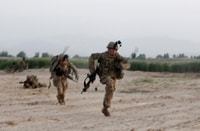
Aaron Deamron, right, and Zach Thomas run for cover as they are fired upon by Taliban fighters during a mission in Zhary district of Kandahar province, southern Afghanistan in April 2012. Thomas would receive a concussion in the incident. (Baz Ratner/Reuters)
Zach Thomas, who had been standing just yards from Lorance when he gave the order to fire, was driving to community college in 2017 when he heard Hannity talking about the Lorance case on the radio.
“My blood just started boiling,” he recalled.
Thomas had spent his last day in the Army testifying against his former platoon leader. He was just 18 when he left for Afghanistan, and like many in the unit, his return home had been difficult. He drank to blunt his PTSD and depression. Two of his sergeants were so worried about him that they let him move out of the barracks and spend his last two months living at their house. His plan after the Army was to forget about Afghanistan and start a new life in his hometown of Crosby, Tex.

Zach Thomas and Jake Jensen before their deployment at Fort Bragg. (Courtesy of Zach Thomas)
Thomas pulled over on the side of the road and looked up the number for Hannity’s radio show in New York City on his cellphone.
“I’m a big fan, but y’all are being led the wrong way,” he told a producer for the show. “This isn’t some innocent guy.” The producer asked him if he knew about the biometric data Lorance’s lawyers had uncovered.
“I don’t know about any of that information, but I was there and these people were not enemy combatants,” he said. He could tell he wasn’t convincing the producer so he gave her McGuinness’s cellphone number and urged her to call him. She talked with McGuinness as well but never invited him on the show.
A handful of other soldiers from the platoon did their best to counter Lorance’s story. Todd Fitzgerald, who was also standing near Lorance when he ordered the killings, took to Reddit to defend the unit. He and several other soldiers spoke to the New York Times for a story that detailed the inaccuracies in Lorance’s defense. Fitzgerald, McGuinness and Gray were interviewed for a documentary about the case, “Leavenworth,” that aired on the Starz Network.
In April 2018, the platoon suffered its fourth death since returning home when Nick Carson, 26, crashed his car late at night.
Carson had been with McGuinness in Afghanistan on the day of the killings, and like his squad leader had been threatened with war crimes charges.
“I don’t know what’s fixing to happen, but our platoon leader is making us all out to be murderers,” he told his parents in a 2012 phone call from Afghanistan. “Just know, I am not a murderer.”
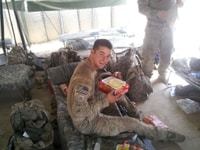
Nick Carson eats a meal during his deployment in Afghanistan in May 2012. (Photo by Dave Zettel)
Carson’s mother and stepfather were at Fort Bragg a few months later when he returned from the war. “He got off that big plane, hugged us and cried and then he said, ‘I love y’all but I need to be by myself. I just need to go,’ ” recalled his stepfather.
Carson stayed in the Army after the combat tour, but he struggled with PTSD, depression and anger. He and Ruhl had been best friends and were supposed to go to Hawaii together when they returned from Afghanistan. After Ruhl’s death, Carson tried to explain on the platoon’s private Facebook page why he was skipping his friend’s funeral. “It’s not that I can’t physically be there,” he wrote. “I won’t let my last memory of Jarred be at his funeral. I am sorry for that. Most of you know how close Jarred and I were, so this has been extremely difficult to accept.”
On the night of the car accident that killed him, Carson had been drinking and wasn’t wearing a seat belt. His parents said he may have fallen asleep while driving. The platoon blamed the war crimes and the deployment.
In Afghanistan, the platoon had dubbed themselves the “Honey Badgers” after the fearless carnivore.
Back home, they began to refer to themselves as “the cursed platoon.”
‘Who is it this time?’
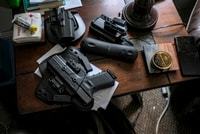
A loaded pistol on a side table in the home of Lucas Gray in Pulaski, Va. (Bonnie Jo Mount/The Washington Post)
On October 23rd at 2:44 a.m., Twist’s wife, Emalyn, messaged Sgt. 1st Class Joe Morrissey, who had been Twist’s team leader with the platoon in Afghanistan.
“James committed suicide tonight,” she wrote from the hospital where the doctors were preparing to harvest his organs. “Could you let his other Army friends know. . . . This is a fucking living nightmare.” It was the platoon’s fifth death since returning home four years earlier.
Morrissey woke to the message at Fort Bragg and began sobbing. His soon-to-be ex-wife knew immediately that another member of the platoon was gone. His first call was to McGuinness, who was returning home from a late-night shift as a bouncer at a Fayetteville bar. The two immediately began calling the rest of the platoon, which was scattered across the country.
The deaths had imbued them with a grim fatalism. “Who is it this time?” a few answered when they saw the 5 a.m. calls from Morrissey’s phone.
“It’s James,” Morrissey said again and again.
At Fort Jackson, Zettel was administering a predawn fitness test to recruits when he got the call. He punched a fence and rushed back to his office so the new soldiers wouldn’t see him fall apart. Alone at his desk, Zettel thought about the steady stream of calls and texts Twist had sent him over the past five years, and he wondered if the messages were an indirect way of asking for help.
McGuinness caught Gray as he headed off to his job at a weapons arsenal in southwest Virginia. His wallpaper on his work computer was a photo of Twist and him in Afghanistan, their rifles slung across their chests. “Back when we were cool,” Twist had written when he texted it to Gray.
The hardest call was to Walley, the soldier Twist had dragged from the blast crater. “What’s wrong?” his fiancee asked him when he got the call. “It’s Twist,” Walley told her. She tried to hug him, but he pushed her away. “I need to take this in alone,” he said.

Samuel Walley with his fiancee Hannah Smallwood in their garage in Buford, Ga. Walley lost his right leg and part of his left arm in Afghanistan. (Bonnie Jo Mount/The Washington Post)
At the funeral, Walley spoke first for the platoon, rocking back and forth on his prosthetic leg. Walley was wounded a month before the murders, but they had affected him too. At times, he felt abandoned by those who had tried to distance themselves from the unit, the murders and the war. “I have to wake up every single day and look in the mirror. Every single day I am hopping in a wheelchair,” he often thought. “I don’t get to forget.”
In January 2016, he was drunk and despondent in his apartment outside Atlanta and accidentally fired his pistol through the ceiling and into the apartment above him. After the shooting, Walley cut back on his drinking and returned to college. He was just one semester from graduating.
He stared out at the packed and silent church.
“Twist would probably give me a little bit of crap right now for having not wrote a speech,” he began. “But I figured I’d just tell a story. It’s a little bit of a harsh story, but I think it needs to be told.”

Members of the 1st Platoon at James O. Twist’s funeral in Grand Rapids, Mich., in November 2019. From left: Joe Fjeldheim, Jake Jensen, John Twist, Zach Thomas, Dan Williams (holding left side of flag), Alan Gladney (wearing glasses), Lucas Gray (partially visible), Reyler Leon, Samuel Walley, and slightly behind him is Dave Zettel, Brandon Krebs, and Mike McGuinness (in sunglasses), Brandon Kargol, Joe Morrissey, Dom Latino, Dallas Haggard, Brett Frace and Zach Nelson at the far right. (Courtesy of the Twist family)
Walley had spent dozens of hours reconstructing every second of the day he was injured. Eight years after the blast, he and his fellow soldiers would still argue over the smallest details: What kind of bomb had caused his wounds? Was it a pressure plate or remote-detonated? What exactly did Morrissey say as he and Carson lifted Walley into the helicopter? For Walley, the details were sacred. Remembering brought him comfort.
He took a breath and described the explosion and its aftermath. “My right leg was about 20 feet away. It was completely removed. My left leg, the tibia ripped through the [skin]; my foot was facing toward my butt,” he said. His right arm was mangled.
“Twist ended up coming through this cloudy haze,” Walley continued. “He was the most selfless man that I ever knew on this planet. He did not care if he died. He did not care if his limbs were to get ripped off. He didn’t care. He just cared that his guys were okay.”
A few minutes in a combat zone can define a life for good or for ill. “I believe that 10 minutes defined Twist,” Walley said.
Morrissey spoke next of Twist’s successes as a soldier, state trooper and father. “Those of us who knew Twist were extremely proud,” he said. “Unfortunately . . . underneath it all, the demons are still there, still tearing away at us day in and day out.”
‘The men and women in the mud and dirt’

President Trump welcomes Army 1st Lt. Clint Lorance and Army Maj. Mathew Golsteyn, left, at the Republican Party of Florida’s Statesman Dinner in December 2019, in Aventura, Fla. Both soldiers were granted full pardons by Trump. (Joyce N. Boghosian/The White House)
The 1st Platoon soldiers were still filtering home from Twist’s funeral when Pete Hegseth, a “Fox & Friends” co-anchor who had advocated on Lorance’s behalf, tweeted that Lorance’s pardon was “imminent.”
The actual release came two weeks later on Nov. 15.
“It’s done. It’s a political move,” one of the 1st Platoon soldiers wrote on the group’s private Facebook page. “Time to move on.”
Ayres, who had skipped all five of the platoon’s funerals, agreed. “Not worth any of our time,” he wrote. “What matters is that everyone that matters knows he is a piece of s—. Let’s move on and enjoy life.”
For McGuinness it wasn’t an option. He couldn’t bear the thought that Lorance was being hailed as a hero by Trump and others, while soldiers like Twist were being forgotten. “I’ve buried people that struggled with what happened, and whether through their own hands or their actions, they’re gone,” he said. “I’m not going to sit quietly while he gets paraded around and they’re not recognized.”
He texted with Gray, who wasn’t on Facebook.
Lucas Gray

Fuck it all. The one reprieve we had is gone.
Mike McGuinness
I feel so shitty right now.

Lucas Gray

I’m going to drink until I can sleep.
Mike McGuinness
I might do the same.

Others in the platoon argued on social media with pro-Trump friends, who insisted Lorance was innocent. “You realize I was f—ing THERE, right?” one soldier wrote to a fellow veteran. “Like you realize I was one of the godd— WITNESSES who testified, right?!”
Later that evening, Twist’s father, John, called McGuinness, hoping to talk about his son and the pardon. McGuinness shared his memories of Twist, who came to the platoon when he was just 19. “We put so much work into him,” McGuinness said. He talked about Twist’s quirks — his irritating tendency to correct McGuinness when he got a minor fact wrong about a weapons system.
Twist’s father asked whether the murders and the trial might have contributed to his son’s torment. Twist wasn’t on patrol the day of the killings, but McGuinness believed that what had happened with Lorance had wounded him too. “Twist had a big heart. He was like Gray. He wanted to do good,” McGuinness said. “When Lorance took that away, he took a little part of Jimmy, too.”

“You don’t go into the military thinking you are going to be part of a war crimes case,” said Mike McGuinness at his home in Raeford, N.C. (Bonnie Jo Mount/The Washington Post)
“This is absolutely amazing,” Lorance said as his car, escorted by the county constable, rolled to a stop in the high school parking lot.
“It’s a hometown hero’s welcome,” said his cousin from the back seat.
Lorance climbed atop a flatbed trailer. Someone from the crowd gave him an American flag. The vice commander of the local VFW handed him a microphone.
“God Bless Texas!” Lorance yelled. “God Bless America!”
At his side was the head of UAP, the group that had worked to free him. Lorance’s case and the publicity generated helped the group boost annual donations by about 150 percent, from $1.8 million in 2015 to more than $4.5 million in 2018.
Lorance, who was wearing his crisp, blue Army uniform — his pants tucked into his boots, paratrooper style — knew exactly what his backers wanted to hear. “We finally have a president who understands that when we send our troops to fight impossible wars, we must stand behind them,” he told the crowd.
“Amen!” cried a voice from the high school parking lot.
“Amen is right!” Lorance answered.
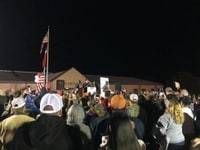
Former 1st Lt. Clint Lorance addresses a crowd as he returns home to Merit, Tex., on Nov. 16, 2019, after he was pardoned by President Trump. (Courtesy of Farmersville Fire Department)
For those in the parking lot that night, Lorance’s freedom was proof that Trump would stand up for them and their town, population 215, at a moment when large swaths of the country seemed to hold them and their way of life in contempt. “You know how many people just want to see that someone cares,” said Tiffany West, 37, who was standing feet from the stage.
Lorance thanked his family and the lawmakers who pressed for his release. He talked about Trump and Vice President Pence, who had called him at the penitentiary to tell him that they were setting him free. “We had a nine-minute conversation,” Lorance said. “Yeah, I was timing it. . . . They took time out of their busy day to ask me what I was going to do with the rest of my life.”
He blasted the craven “deep state” military officers he blamed for his conviction. “That’s not really the military. That’s the politicians who run the thing,” he said. “The men and women in the mud and dirt. That’s the real U.S. military.”
He was still talking nearly an hour later when the television news crews from Dallas, about 60 miles away, began packing up their equipment.
“I’m sorry,” he apologized. “I know it’s cold.”
“Go ahead!” a voice shouted.
“You’re home!” added another.
Soon the crowd began drifting away for the night, past Merit’s post office, its volunteer fire department, its recently shuttered convenience store, and the decaying wood clapboard building that once held its cotton gin. Lorance handed the microphone back to the local VFW’s vice commander, a Gulf War veteran who had organized the gathering and would now get the final word.
“There’s going to be people out there that are going to try to use this against Trump,” he warned. “Well, we’re going to throw it right back in their faces!”

Lorance visits the set of “Fox & Friends” in New York on Nov. 18, 2019, after receiving a presidential pardon. (Mark Lennihan/AP)
The next morning Lorance boarded a plane for New York City, where he appeared on “Fox & Friends” and Hannity’s radio show. In December, he joined Trump onstage at a GOP fundraiser.
In interviews after his release, Lorance insisted that the soldiers who testified against him were pressured by the Army or had turned on him because he was an exacting commander and they lacked discipline. “When I walked into the guard tower and the soldiers didn’t have their helmet or body armor on, I told them to put it on,” he told Blue Magazine, which advocates on behalf of police officers. “And they didn’t like that, they didn’t like taking orders like that, but I was brought in there to enforce the standard.”
‘There’s almost always more to every story than we know’
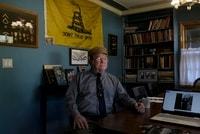
John Twist created a wall in his living room memorializing James and other family members who served in the military at his home in Grand Rapids, Mich. The flag was signed by members of James’s platoon after his funeral. (Bonnie Jo Mount/The Washington Post)
In Grand Rapids, Twist’s father spent much of the winter trying to unravel the mystery of his son’s death. His dining room table was covered with foot-high piles of papers from James’s life.
There were old report cards, passports and programs from high school wrestling matches. A second pile from the Army included a spiral notebook that his son had used as a diary when he was going through basic training. A third pile contained a printout of the essay — “The Invisible War Inside My Head” — that his son wrote the day before he died.
In it, Twist wrote briefly about the killings that had “rocked and split up” his platoon. The longest section of the essay recounted the day Walley lost his arm and leg. “I found Sam in a small crater,” he wrote. “He was missing his right foot and all the muscle and skin around his right tibia/fibula.” That image, he said, played again and again in his head when he returned from the war.
“I really don’t understand what PTSD is,” his father said. “You can read about it, but I don’t get it. So far the only thing I can get is that it’s like having . . . poor Sam Walley getting blown up” playing in your head over and over. “And how do you get rid of that?”

James O. Twist with his son Ben, celebrating his first birthday in August 2019. (Courtesy of the Twist family)
Twist’s wife, Emalyn, 27, also had been thinking about the meaning of her husband’s life and sudden, violent death. In early March she was sitting alone in the parking lot of a nearby Target. Her three children — ages 1, 3 and 5 — were with a friend. She balanced a Starbucks coffee in one hand and hit record on her cellphone camera.
“It has been kind of a bad week, filled with a lot of ‘it shouldn’t have to be that way’ kind of moments,” she said. Earlier that morning, she had turned over their house keys to the new owners. Her 5-year-old son spotted the family’s moving trucks in the driveway and panicked, yelling for her to “stop them.”
Twist’s children remembered their father as a dad who liked to wrestle and sing them to sleep. Emalyn couldn’t forget her husband’s insecurity, bouts of self-loathing and verbal abuse. On the night her husband took his life he was upset with her for going to see a therapist and terrified that she was going to divorce him. In a blog post, Emalyn described him slamming his head into the kitchen counter until blood was running down his face. Then he stormed to their bedroom and shot himself.
Emalyn pressed a pair of leggings to her husband’s head in a futile attempt to stop the bleeding. With her other hand, she dialed 911. As she listened for the sound of approaching sirens, she stifled the urge to vomit and prayed that their children would not wake.

Emalyn Twist writes about her experience following Twist’s death in Emalyn’s Blog: Words of a Young Widow. (Bonnie Jo Mount/The Washington Post)
“I couldn’t stand to live in that house or sleep in that bedroom when I had seen so much in there, and that just makes me mad, because I loved that house and I loved that neighborhood,” she said to her cellphone camera. “And I shouldn’t have had to leave. I shouldn’t have had to pull my kids out of their little social circle and all those people who loved them. It shouldn’t have to be that way.”
For years she had helped her husband hide his pain from family, friends and even his fellow soldiers. Now she was determined to be honest. “I just don’t have to keep up this facade of the grieving widow all the time, even though that’s also what I am,” she said. “There’s almost always more to every story than we know. It’s important to pay attention to that.”
She stopped recording, turned on the ignition and picked up with her day.
‘I love you’

Dave Zettel at home with his wife, Kim, in Blythewood, S.C. The couple are expecting their first child. (Bonnie Jo Mount/The Washington Post)
In April with the country locked down by the coronavirus, McGuinness arranged for a dozen of the guys from the platoon to get together on a video call for beers. He and Walley were finishing up their last few college courses before they graduated. A couple of the soldiers and wives were expecting their first children. Two were in the early days of divorces.
An hour into the call almost everyone was drunk or stoned — except for the pregnant wives. One soldier kept streaming as he sat on the toilet. When he was done everyone screamed at him to wash his hands. Another soldier vomited and curled up on the floor.
“This is better than getting together at funerals,” McGuinness said cheerily.
The troops talked about their plans for the future. Morrissey was just back from another tour in Afghanistan, where he mostly sat on base while the Afghans fought each other. “There’s no war left there anymore,” he said.
“What are you going to do when you retire?” McGuinness asked him.
“Let me finish, before you laugh,” Morrissey replied. “I’m going to go to school to be a barber and open one of those high end barber shops where you can get a drink, a real gentleman’s haircut and shave with a straight razor.”
Walley tried to talk, but everyone was talking over him. “No one listens to me,” he joked. “Everyone just stares at the guy with two limbs.” He and his fiancee were planning their wedding for the spring of 2021. They had already reserved a “mansion where we can fit the whole platoon,” he said.
“Just tell me the day and I’ll be there,” McGuinness promised.
Zettel and his wife were expecting their first child on Aug. 10. He was planning on leaving the Army for good in October. “It’s not going to join the Army,” Zettel said of his unborn child. “I’m going to burn everything so it doesn’t even know I was in the f—ing Army.”
The soldiers talked about the guys they had lost to suicide and self-destructive behavior. And they spoke briefly about Lorance, who has a memoir titled “Stolen Valor” that is going to be published by Hachette Book Group in the fall, when Lorance has said he is planning to start law school. A blurb for the book, posted by the publisher, calls Lorance “a scapegoat for a corrupt military” and asserts that “his unit turned on him because of his homosexuality.” Lorance’s lawyer said there was no evidence that homophobia played a role in conviction.
“We looked,” Maher said, “and we came up with nothing.”
In interviews, troops said that in Afghanistan they didn’t know Lorance was gay and wouldn’t have cared.
“We took s— from so many people for so long,” McGuinness said. “I’m not letting that happen anymore. I’m going to fight back.”
The soldiers shared tips about how to find a good therapist and promised to look out for one another so that there would be no more funerals.
“You guys mean everything to me,” McGuinness said. “We have to do this more often. We have to look after each other. If you guys are hurting, hit me up. We can do this instead of just letting things fester.”
He rose from his desk chair — a little wobbly from all the beer. It was 2:30 a.m., and they had been talking for more than four hours. “I love you a–holes,” he said, and signed off the call.

An American flag decorates a roof along a country road in North Carolina. (Bonnie Jo Mount/The Washington Post)
[ Are you a veteran? We want to hear your response to this story. ]
Under the current administration, the Office of the Pardon Attorney has become a bureaucratic way station, data and interviews show.
0 notes
Link
The increasing profile of Islam in public life is influencing recent constitutional debates in China, signaling that even China’s socialist legal system must account for the rights and duties of Muslims.
In recent years, China has become increasingly active in Muslim states. Xi Jinping, the President of the People’s Republic of China (PRC) and General Secretary of the Chinese Communist Party (CCP or Party), has embarked on a number of trans-regional economic and security measures to align China’s interests with those of Muslim-majority states in South Asia, Central Asia, and the Middle East. Last year, Xi pledged $46 billion to the China-Pakistan Economic Corridor (CPEC) that will create infrastructural ties between the two countries. The hallmark of China’s re-engagement with the Muslim world is Xi’s “One Belt, One Road” initiative, which includes not only CPEC, but also the China-Central Asia-West Asia Economic Corridor.
While China has ambitiously pursued commercial relations with Muslim states, it has, at the same time, sought to limit the influence of Islam in China. Such tailored foreign policy has had mixed impacts on the country’s 23 million Muslims, including Chinese Muslims (Hui) and Turkic Muslims (Uyghurs).
On the one hand, interaction between China’s Muslims and co-religionists abroad has intensified through business, pilgrimage, and intellectual exchange. In conducting research on China’s question over the past decade, I have seen signs of revival throughout China: the construction of mosques and madrasas, the popularization of conservative head-coverings, increasing translations of Arabic and Farsi works, and the spread of Islamic media. Hui, in particular, have benefited from new economic links with Gulf States, attracting investment and aid dollars.
On the other hand, restrictions in Xinjiang continue to hamper Uyghurs’ ability to interact with co-religionists across the border, particularly following the deadly riots in 2009 in Urumqi and terrorist attacks in Beijing in 2013 and Kunming in 2014. As a result of this violence, security forces have restricted domestic and cross-border movement of Muslims.
The halal food industry highlights the contradictions between China’s external opening and domestic tightening. Hui, in particular, have been keen to access the global halal market, valued at $1.4 trillion per annum. The central government views halal food production as a win-win situation: a relatively innocuous vehicle for Hui – foreign Muslim engagement that would boost local economies and permit Hui to capitalize on their membership in the global community of Muslims.
The Ningxia Hui Autonomous Region (“Ningxia”) has become a center for halal food production. According to a report by the Ningxia Academy of Social Sciences, by 2010, the total volume of sales in halal goods in the region exceeded $1.5 billion. Through government subsidies and tax-free zones, Ningxia Hui have sought to increase trade between the region and the Middle East through halal foodstuffs. By 2010, Ningxia Hui were exporting over $1 million worth of halal food per annum to Malaysia, the UAE, Qatar, and Egypt. It would seem that qingzhen (Chinese for “halal”), which anthropologist Dru Gladney called the “sacred symbol” of Hui that can be seen on restaurants, grocery stores, and even barber shops in the northwest, has received the imprimatur of the government.
In China’s multi-ethnic northwest, qingzhen is a kind of taboo, marking the Hui minority from the Han majority. Yet taboos, as another anthropologist, the late Mary Douglas, instructed, are dangerous. The relatively successful story of halal “made in China,” has become marked by scandal. Over the last month, academic, policy, and popular circles have been seized by a debate about the constitutionality of a law on halal food.
As early as 2002, the State Council had entrusted the Ethnic Affairs Committee of the National People’s Congress (NPC) with the task of drafting legislation to regulate halal food production. The demand occurred a year after China acceded to the World Trade Organization that stipulates rules regarding food safety, specifically the Agreement on Technical Barriers to Trade. According to a 2006 report commissioned by the State Ethnic Affairs Commission (SEAC), an organ that sets policies toward ethnic and religious minorities, some 29 provincial and municipal governments have enacted regulations for halal food. However, there is no nation-wide piece of legislation – keeping Hui from establishing halal food companies and participating in China’s engagement with Muslim states.
According to Li Ziran, the head of the Halal Industry Development Research Center at Ningxia University, “In recent years, domestically, over 1,000 companies through different approaches have successfully obtained the symbol of authenticity [to make] overseas halal products. But as for nation-wide halal enterprise teams, these numbers are quite small.” In the course of my fieldwork, I encountered several instances where so-called halal food was produced, but did not meet the requirements of sharia. For instance, pork was used in its making, which led to Hui protest and inter-ethnic confrontations.
Enter Wang Zhengwei. Wang, a Hui from Ningxia, as the head of the SEAC, has spearheaded an effort to introduce more consistency in the licensing of halal food. Wang’s efforts have generated an unusual debate in the Chinese Internet: whether a socialist state can legislate in accordance with a religious law. Although China’s legal system has facilitated private transactions over the past 30 years, in many areas of public law the PRC is still very much a socialist legal system. It does not recognize religious law including sharia, although Article 36 of the PRC Constitution does provide for “freedom of religious belief.” In practice, however, CCP rules, not state law, determine the boundaries of what qualifies as “religion” and the extent of its “freedom.” Nonetheless, the debate that ensued over the Internet and social media lodged its arguments often in constitutional language.
Conservative voices, such as Xi Wuyi, a scholar of Marxism at the Chinese Academy of Social Sciences, opposed the halal food law. Detractors feared that such legislation eroded the division between church and state, and endangered China’s national security. Opponents further argued that the constitution could not endorse tenets of Islamic law. More extreme views saw the law as a Trojan horse that would expose the Chinese government to Islamization and would force Han Chinese to follow Islamic law. They sought a rethinking of foreign policies that they believed went too far in opening China up to the Muslim world.
On the other side, Lu Nan, an assistant professor of comparative law at Tsinghua University Law School, weighed the capacity to follow one’s religious law, what he saw as the kernel of religious freedom, as guaranteed by the Constitution, against a presumed violation of church and state, and found that the proposed legislation did not transgress this principle.
These debates reached the highest levels of government. At last March’s “two meetings” of the NPC and the Chinese People’s Political Consultative Conference, an advisory organ, officials appear to have initially considered the halal food law. The law was included on the agenda of the 2016 Legislative Work Plan of the State Council, the highest administrative body in the country, yet was subsequently deleted. Likewise, the National Religious Work Meeting – held in Beijing on April 22 to 23 and attended by Xi, premier Li Keqiang, and other top-ranking leaders – appears to have discussed the issue as well.
Xi seemed to close the matter during that meeting when he stated, we “must persist in the separation of church and state, persist in preventing religion from interfering with administration, judiciary, education, and other such state functions.” Five days later, on April 28, Wang Zhengwei was removed from his post. Although explanations abound in Chinese social media for his fall, one majority view is that he was pushing too hard to advance China’s first national legislation on halal food.
As China increases its presence in Muslim states and links between its Muslim minorities and co-religionists deepen, it is only likely that these sorts of conflicts of law will increase. Previous constitutional debates have centered on issues such as property rights or certain forms of detention. The framing of the question of halal food legislation as a constitutional matter raises for the first time a question that pertains to religious minorities. At the same time, the scuttling of the draft legislation suggests that conservative voices have largely won the day. It is too soon to say whether this recent debate signals an Islamophobic turn in the highest levels of the government.
The PRC’s treatment of its own Muslims will reflect on the leadership’s ability to connect with counterparts in the Middle East and elsewhere. Meanwhile, legislation struggles to keep up with the dynamics of an externally Muslim-friendly PRC and an internally discordant one.
In the wake of the National Religious Work Meeting, Li Jianhua, the CCP Secretary of Ningxia, vocalized some of the tensions in China:
“There is the increasing dilution of the symbol of halal in the marketplace: halal water, halal paper, halal toothpaste, halal cosmetics, and so on. From the high vantage of protecting state safety, we must sharpen our vigilance, know what is coming from small clues, nip evil in the bud, practice discriminating thoughts, [and] completely respect the customs and habits of ethnic minorities to prevent the dilution of the halal symbol…”
Here, then, is the Hui official’s dilemma: how to prevent the misuse of the sign of halal in a system that does not recognize sharia. Against a backdrop of near global hysteria about sharia, the leadership will have to carefully weigh its commitments to socialist law against the needs of its increasingly visible Muslim citizens.
Matthew S. Erie is trained as a lawyer and an anthropologist. He is an Associate Professor of Modern Chinese Studies at the University of Oxford. His new book is China and Islam: The Prophet, the Party, and Law (Cambridge University Press, 2016).
0 notes
Photo

Oranges, Cadillacs, Campbell Soup Cans, Black American History, & God Oranges. You can bet on finding one in my refrigerator every time you open it. We even have a special orange peeler made by Tupperware. I love peeling back that tough exterior and the excess white residue underneath to reveal that juicy sweet goodness. Or sometimes cutting the oranges into slices and devouring them until it looked as though I am wearing a unique mouth guard. Now, I look at these oranges and imagine George Starling, the Blye brothers, and other pickers scaling large trees all day for pennies. Picturing George “Schoolboy” Starling using his intellect to calculate what the grove owners promised to pay and then finding their paychecks not adding up. I envision how George realized that World War I depleted the workforce. He then would convince the majority of pickers to only work fair wages or not work at all. George knew the grove owners themselves could fill the demand and would have no choice but to breakdown and pay the appropriate wage (without cheating their paychecks because George Starling could do the math). See George knew that black men and women would typically work all day for seventy-five cents or maybe a dollar, but he also knew picking in the grove with fairer wages could be bring in that same amount in just an hour or two. Under his leadership George basically formed his own union because he knew the grove owners had no choice, if they wanted to get paid they had to have pickers. Mr. Starling stood strong against the white owners. George wouldn’t budge either, it was his price (a fair price) and not a penny less. Yes sir, oranges will always taste a little sweeter to me now. Cadillacs. My father-in-law owns a brand new cherry red 2017 Cadillac. It has a sleek new modern design, but that logo still stands out. The Cadillac crest sits prominent on the back and front of the vehicle. When I see it, Big Boi & Andre 3K echo in my head rhyming about two dope boys in a Cadillac with me and you, yo momma and yo cousin too rolling down the strip and slamming the doors. One does not have to be an automotive expert to spot a Mercedes, Audi, or Ferrari just by the logo…and the Cadillac logo is no different. No doubt about it, Cadillacs represent luxury. However, now when my father-in-law pulls up in my driveway I immediately recall the young aspiring Dr. Foster earning the money to buy a brand new Cadillac himself. He wanted a car that would spark interest and grab the attention of potential clients. After all, Dr. Foster was a man of style and first impressions. Even though, he earned enough money to purchase a Cadillac, when Dr. Foster visited the local dealership he was only offered the used models. Evidently Negroes at this time were not worthy of owning a brand new one despite the ability to afford one. That Cadillac symbol now makes me visualize Dr. Robert Pershing Foster feverishly writing that letter to the Cadillac manufacturers describing his experience. Then not only being granted to purchase a brand new Cadillac but also choosing the color and model which would be delivered to him. If I get the opportunity to get behind the wheel of my father-in-law’s precious Cadillac, I will definitely daydream about Dr. Robert Pershing Foster cruising around to his patients, his practice, the race tracks and casinos. Letting all the onlookers know, the doctor has arrived. Campbell Soup cans. My wife is always stocking our pantry. She will be the first to tell you we have items that need to be kept in multiple quantities at all times. One of these said items are varieties of Campbell soup. These soups are commonly used for ingredients for various meals, while some are just the company’s famous chicken noodle soup. I’m convinced their chicken noodle soup completely eradicates almost any head cold and sore throat. These staple Campbell products in our household all come in cans still. Going forward these cans will always bring George and Ida Mae Gladney to mind. Both working long hours for wages lower than their white co-workers. George working the canning machines over and over and over for years with that repetitive labor wearing on his body. Ida Mae finally getting a job at the Campbell plant that would free her from the stereotypical female “slave market” jobs. These “slave market” jobs were basically groups of black women waiting to be handpicked by white women who would pay them to do their household chores, grocery shopping, or sometimes other menial tasks. I try to visualize the various homes the Gladney family lived in before finally purchasing their first three story flat with the help of the steady work the Campbell plant provided. Yes indeed, George and Ida epitomized work ethic. Yet George still had time to open the church every Sunday. To me a can of Campbell soup might as well have a picture of George and Ida Mae Gladney on it. One may think it is foolish for a can to recall such images, but it will. The images of a life of hard work, struggle, faith, heartbreak, and incredible perseverance. Black American History. My knowledge of black history was forever transformed by this book. I thought I had an idea of what hatred and evil black men and women endured from arriving in 1619 until the Civil Rights Act of 1964, that’s 345 years…that’s approximately 6 generations. A day to day fear of not knowing if you were going to be beaten, lynched or raped…or maybe all of the above with no recourse or accountability. Like George Starling’s friend, Reuben Blye, recalling helping his uncle cut down a limp, lynched body out of tree they spotted on their way to run errands, when Reuben was only ten years old. Or Ida Mae’s friend Joe Lee, who was beaten almost to death for being wrongfully accused of stealing turkeys. Ida Mae recounted he was beaten with chains until Joe Lee’s overalls turned red with blood and stuck to his skin as if with adhesive. Her husband George and other men had to use grease to peel the overalls off of Joe Lee, just as their slave forefathers had done generations before. Not to mention the “stolen” turkeys wandered back to the farm from the woods the next day. No apology offered, just another day in the life. Then there is a black soldier named, Wilbur Little, who returned home in 1919 after his tour of duty in World War I. He was greeted by a band of white men demanding he take off his uniform and warned him to leave town if wanted to continue to wear it. Days later, Mr. Little was found beaten to death in his uniform. This man fought for a country that killed him when he returned. Yet, we call Colin Kaepernick un-American? There was a quote in the book from a white southerner in the early 1940s that stated “the killing of a Negro by a white man ceased in practice even to call for legal inquiry.” How many unknown deaths? How many unrecorded lynchings? How many murderers went unpunished by the law? I think little Eddie Earvin summed it up best when he recalls passing by a white church where the kids threw rocks and bricks at him calling him the vilest of names and asking his grandparents, “What kind of god they got up inside that church?” God. “Over the course of six decades, some six million black southerners left the land of their forefathers and fanned out across the country for an uncertain existence in nearly every other corner of America”, writes Isabel Wilkerson. Six million? I find that number six million astounding because after reading this Pulitzer Prize masterpiece I’ve realized that means six million different reasons. Six million different journeys. My biggest take away from this revelation of the Great Migration is the following. We are all fearfully and wonderfully made in the image of God. There is no such thing as being “colorblind” because God obviously is not “colorblind.” We live in a country, or a world for that matter, made up of different skin colors and cultures, yet we are all dynamic and uniquely made. Why do we still feel the need in American culture to place, not just black men and women, but all men and women in boxes? We resort to political, religious, and sexual labels as if we are not more than those? Why must we continually place limits on their greatness? Why must we ignorantly react to the cries of the marginalized? How can we come to understand another culture instead of forcing that culture to stop being different? Will the “U.S.” ever be “us?” Well, for me it was simply learning more about the culture’s existence. A culture that survived 345 years (if we are honest 398 years and counting) of oppression. A culture which relied on their family members and loved ones spread out all over the country for shelter, food, and basic day to day survival. A culture where many saw through all the injustices and hate but still saw Jesus. The Lord of Lords, the King of Kings, the resurrected Son of God who would not forsake them. The God Ida Mae’s mother, Miss Theenie, would pray to whenever Ida would travel, “May the Lord be the first one in the car/train, and the last out.” The same God, the stoic and strong George Starling would sing to with tears welling up in his eyes and rolling down his cheeks. The same God who young Gilbert Elie heard being called out to in the woods by a black man being lashed. Gilbert heard the black man pray “Father, forgive them, for they know not what they doing. I lived a good life for you, if you never done nothing for me, Lord, please…” Gilbert Elie said fifty plus years later “I ain’t never heard a man pray like that man.” This book only strengthened my love for Jesus, his Holy Spirit, and his heavenly Father above. I will never pray, sing, or read God’s word the same after finishing this book. When you can seek first the Kingdom of God, there is no evil that can overcome you. John McDaniel Thank you #Lecrae , #ShoBaraka , and #Propaganda for this recommendation.
#thewarmthofothersuns#blackhistoryisamericanhistory#isabel wilkerson#lecrae#sho baraka#propaganda#prophiphop#humblebeast#cadillac#campbell soup#jesus#oranges#greatmigration
1 note
·
View note
Text
It's honestly criminal how there isn't a single post of Captain Gladney on tumblr dot com
#IM BEGGING#HE--#I--#i have no obligation to explain myself#captain gladney#gladney#gladney call of duty#call of duty gladney#call of duty#call of duty black ops#call of duty black ops 6
40 notes
·
View notes